no title
I'm content with this way: nonexistence.
Why so much advice about existence?
The day I die by that blade, Not-To-Be,
I will laugh at whoever cries for me.
#1250: From Rumi's Kolliyaat-e Shams-e Tabrizi
Another Grand Slam tennis tournament is over and Roger Federer prevailed against his younger opponent. Now he has his eyes on the French trophy and I wish him well in that.
Rumi is at his paradoxical best today: Who will be laughing after he's dead and gone? This is similar to the mystic's paradox: Who or what is aware that the ego has dissolved in the All? Who or what reports on this dissolution? There has to be a wordless aspect to the communication, the bit you can't properly put into words. Hence the classic void and silence at the centre of mystical experience.

10th ox-herding picture @ sacred-texts.com



2 Comments:
I've been reading William Blake lately, and also Northrop Frye's book on him, Fearful Symmetry. Frye made a point of the difference between the mystical and the visionary way of looking at things. Basically, he felt true mystic aren't poets, because he thought poetry debases the mystic non-verbal apprehension, and that poets who are visionary look to mystical experience not as an end in itself but as grist for the poetic mill. I thought that was interesting.
I agree that this is an interesting distinction and will try to get hold of Frye's book to look into it further.
Another way to look at this is to use the concept of the bodhisattva, the enlightened one who returns to this world out of compassion for his fellow humans so as to communicate his vision. The original Buddha was such a person but he didn't become a mystic poet. That tradition is found more in Islam, from its origins (the Quran being essentially God's poetic communication to humanity) and among the Sufis especially (where a continuing tradition of revelatory poetry is supported).
On this analysis, it may be that the true mystic sees that the original end is not final, but only the beginning. In some versions of the oxherding pictures, for example, the void is not the last stage (or #10) but simply a transition to returning to the world, as expressed also in the classic saying: "Before enlightenment, chop wood, carry water; after enlightenment, chop wood, carry water."
So long as poetry speaks out of this mystic non-verbal apprehension, then it is true mystic poetry and doesn't debase anything. Including and especially the world we live in from day to day.
Post a Comment
<< Home